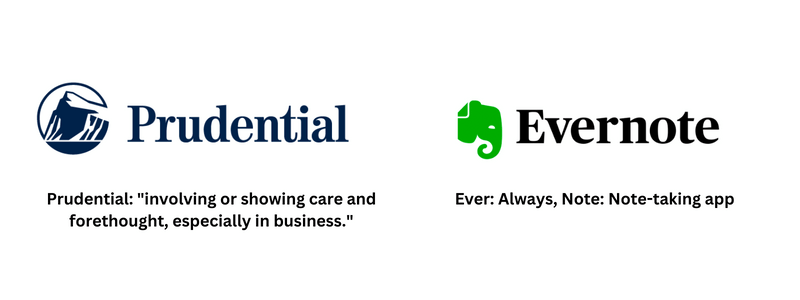If the idea of finding the right name for your business fills you with anxiety, you’re not alone. Business name brainstorming can be really challenging. Fortunately, there’s a formula that makes it easier.
In my years as an entrepreneur, I’ve come up with at least a dozen brand names for companies I’ve started or co-founded, not to mention my customer’s companies and products.
I’ve learned the formula for finding with the right name that it makes the process much easier. It turned me into a business name generator.
For years my process was this:
- Agonize over a name
- Turn it over and over in my head simply willing my brain to come up with something brilliant
- Try to remember every good name I think of
- Poke around in a dictionary hoping some clever word would just pop out.
Not surprisingly, all those tactics that relied on luck turned out to be a complete waste of time.
I realized there had to be a better way, so I developed a system that allowed me to churn out possibilities, pick the best ones, and check the business name availability.
I put my whole formula into an easy to follow Notion template for you. You can grab it here.
Here’s the Business Naming Formula
The formula is deceptively simple and makes the process of coming up with a business name much easier.
Follow these steps and you’ll be a powerhouse business name idea generator.
- Word Association
- Combine & Refine
- Validate & Secure
1. Word Association
At this step you can remove all pressure of coming up with an actual name yet.
At this point we’re just looking to build a large collection words for us to use later, as many of them as you can think of. The goal is to just write down every word that comes into your head, whether you think you’ll use it or not.
First, start by writing out the obvious words, the ones directly associated with your business or industry.
For example, if you’re naming a law service, write down “law, laws, lawyer, judge, judicial” etc.
Writing the obvious words first clears out the first words already in your head so you can move on to the not as obvious words.
Next, start to find the not so obvious and obscure words.
This is where we get creative. A thesaurus or business name AI word association tools can come in handy.
Synonym Threads
One trick I’ve learned is to enter a word into a thesaurus, then click on one of the suggested words to get more suggestions. Often times that new word will have a unique set of synonyms. Then you can rinse and repeat to go down “threads” to find associations and words that weren’t immediately obvious.
For example:
Law → Ruling → Edict → Precept → Axiom
Axiom may never have appeared in the original synonyms for law, but you found it in a thread.
Symbols and Themes
Another useful trick is to think of “themes” or symbolic elements. These can be animals, objects, concepts, that can help describe traits of aspects of your business.
For example the word Prudential means “involving or showing care and forethought, especially in business.” The name is directly letting you know they will be thoughtful and careful with your money.
Evernote for example is a combination of Ever and Note telling you first, they’re a note-taking app, and second “Ever” gives you the sense that they will keep your notes secure and safe always. Bonus, Evernote uses an elephant for their logo because, you know, an elephant never forgets! Brilliant.

2. Combine & Refine
Now that you have a huge list of words, it’s time to refine that list down to the ones that could work.
Take the words that stick out to you and highlight them. Pick ones that best describe your business and sound good.
Generally words with hard sounds like “k”, “t” etc can give your name a sort of staccato rhythm and can make a pleasing sound.
Action words & Descriptors
A helpful trick to take a word and make it unique is to try to combine these ideas with action words, or descriptors.
Think about names like ConvertKit, ClickFunnels, etc. They’re descriptive and the combination of words makes them unique.
Here are some descriptors to get your brain flowing:
- Click
- Kit
- Omni
- Now
- My
- Flow
- Flex
- In
- Out
- Flex
Validate & Secure
Congrats! At this point you’ve whittled down your list of preferred names, now it’s time to make sure they’re not already taken.
There are three things you have to look at now:
- Business registrations
- Domain names
- Social handles
First and most important, is there a business registered with that name already?
If you find a business registered with your exact business name or something similar, it isn’t the end of the world yet. I go into more detail on this point in the Notion guide, but the basics are this: If if it’s in a different industry, you might be ok. You can also experiment with different spellings, but be cautious here as it might make searching for your business more challenging.
Next check whether the domain name you want is available. You have some flexibility here with how you can put together the domain name by using different top-level-domains like .com, .io, etc.
Then find your social handles. Ideally you’d have every social handle match, but that’s not a requirement. You could have some be the name of the business and one or two be “hello_____” or “get____”.
The Notion guide has a database so you can keep track of every name you prefer and keep track of all of these parts of the process for each of them.
Secure
At this point you’ve probably found the one that you’re most excited about and then it’s time to register it.
If you’re in the United States, you have two options:
- Some states allow you to “reserve” the business name
- Or register the business with the secretary of the state
The Business Naming Notion guide has a list of every US state’s secretary of state websites where you can register your business name.
DBA or not to DBA?
Your business’s legal name will probably end in LLC or Corp, but you probably don’t want to list that suffix on everything, especially your website.
That’s where a DBA comes in.
A DBA allows you to operate under different name. For example, if your company is Digital Products Unlimited LLC, you could operate under DigitasKit with a DBA. The DBA form is a separate form from the legal business registration, so be sure to complete that one too.
Once you’ve registered your business with your new name, you’re ready to start making sales and grow!
This process has helped me time and time again with the daunting task of coming up with the right name for my business. I sincerely hope it helps with yours.
If you want a guide to help you with every step of the process, download the Business Name Discovery Guide.
